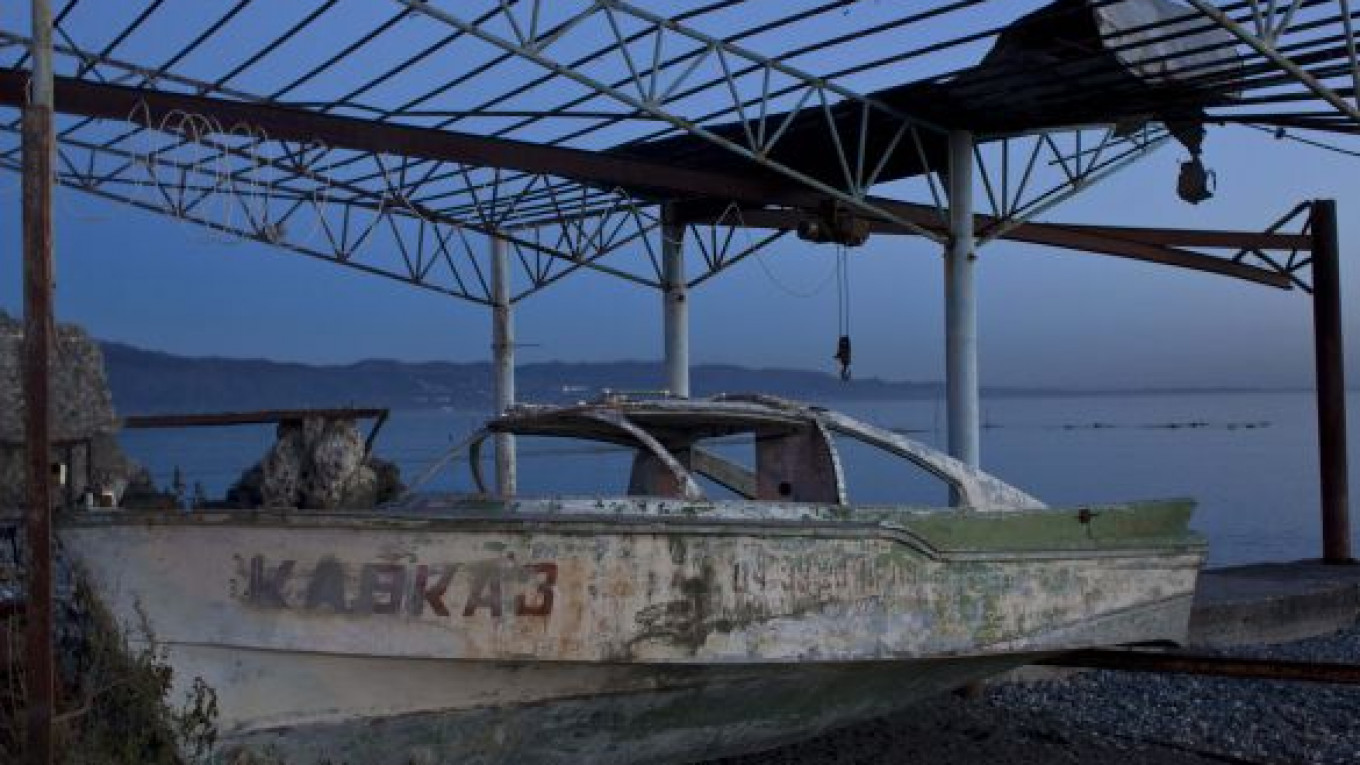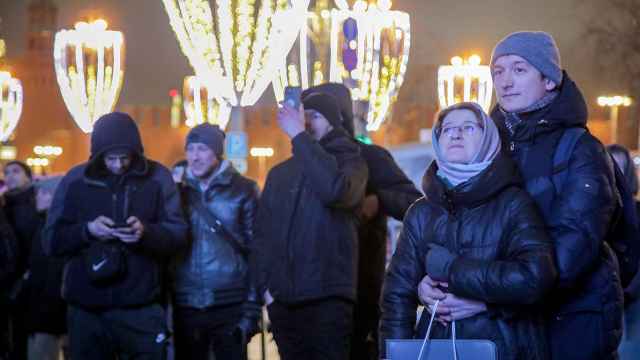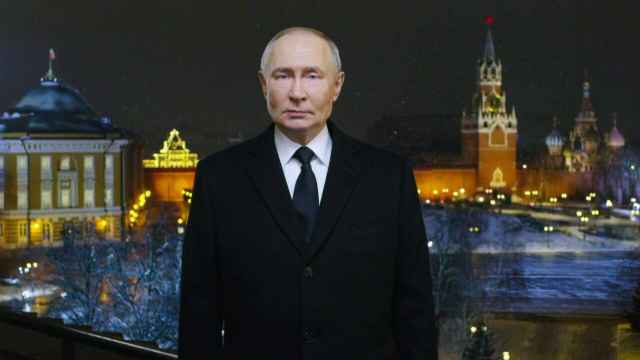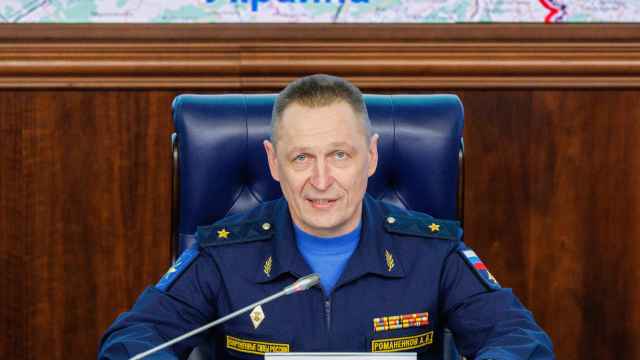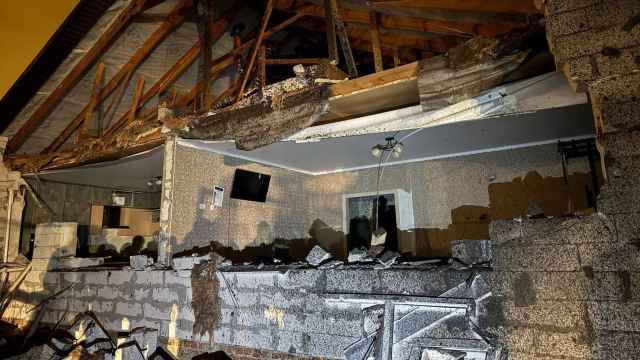NOVY AFON, ABKHAZIA — When celebratory fireworks shoot across the dark Caucasian sky above Sochi on Feb. 7 for the opening ceremony of the 2014 Winter Olympics, people in the neighboring breakaway republic of Abkhazia will be able to see the glow.
But the Olympic Games will be off limits for most of them, as distant as they are for the inhabitants of the Pacific islands of Nauru and Tuvalu, which are the only nations apart from Russia, Nicaragua and Venezuela to recognize the country's sovereignty.
The main Fisht Olympic Stadium is a mere 4.5 kilometers from the Psou River separating Russia from the region that broke away from Georgia in 2008, and many Abkhazians hoped that the investment craze surrounding one of the most expensive Olympic Games in history would spill over the contested border.
Yet what was meant to be a largely symbolic checkpoint between Abkhazia and Russia has turned out to be a more significant barrier.
On Jan. 7, when a heightened security regime was declared in the greater Sochi area in the run-up to the Olympics, crossing the Russia-Abkhazia border became severely restricted. A corresponding decree signed by President Vladimir Putin on Aug. 19, 2013, gave the Sochi 2014 security control center the freedom to decide on the extent of restrictions.
Trains to Moscow will be cancelled for the duration of the Games, and private cars will not be let into Sochi, leaving many Abkhaz fruit vendors who earn their living by selling mandarine, feijoa and tea at Sochi markets in a precarious situation.
"The Games had only a meager effect on Abkhazia. There were expectations that it would lead to construction, which would boost the local economy, but those expectations were in vain," said Alexei Vlasov, an Abkhazia expert and head of the Post-Soviet Countries' Research Center.
Similarly, the Abkhazian delegation and athletes will not be able to attend the Games unless they hold Russian citizenship.
Abkhaz President Alexander Ankvab was more positive about the Games' effect on the region, but gave few details on their effects on Abkhazia's economy. (See interview, Page 4.)
"I believe this experience of cooperating [with Russia] on such an outstanding project will be very beneficial for us," Ankvab told The Moscow Times. "Given the plans to further develop resorts in the neighboring North Caucasus, in Sochi in particular and in Abkhazia, this experience will prove useful in the future."
Now Versus Then
Many decades ago, attention from Soviet movers and shakers prompted lavish investments into Abkhazian infrastructure, making it one of the most prosperous places in the Soviet Union. This manifested itself in Stalinist gothic train stations, with ornate pavilions and monumental colonnades, chic modernist sanatoriums with colorful abstract mosaics and bus stops reminiscent of sea shells designed by Zurab Tsereteli, the infamous architect of Moscow's leviathan Peter the Great statue.
Today, however, Abkhazia looks more like Chernobyl after the blast. Most of the opulence was abandoned. This infuses the place with a special sense of beauty, however, reminiscent of the Roman town of Herculaneum, suddenly preserved by the eruption of a volcano.
In Abkhazia's case, it was not a volcano but the dissolution of the Soviet Union that unleashed ethnic tensions, resulting in a 13-month war from 1992 to 1993. Tens of thousands of people died, and more than 200,000 Georgians were forced to vacate their houses. The republic's population has dwindled to about a third of the almost half a million people who lived there 20 years ago.
The result is a country that went through a civilizational downturn. You see lavish terraces with broken glass and ramshackle doors in the midst of the richest natural setting imaginable: palm, cypress and lemon trees, all sitting on the foothills of the Caucasus, overlooking the indigo-colored Black Sea.
Restoring the mess will be a challenge, but the Kremlin seems to take the task very seriously. Vladislav Surkov, the official who formulated Russia's ideology in the 2000s, was appointed Russia's point man for social and economic relations with Abkhazia and South Ossetia in September 2013.
As a presidential aide, Surkov made a little-publicized visit to Abkhazia at the end of November, where he attended a parade commemorating the 20-year anniversary of the war with Georgia. Today, Russian troops are stationed in Abkhazia, while the Russian ruble is the currency that Abkhazians receive their Russian pensions in. Most of them possess Russian citizenship.
Abkhazians are predominantly Christian, but many also observe rituals of Abkhaz paganism, which serves as one of the cornerstones of the local identity and is currently experiencing a resurgence. Seven holy shrines divide Abkhazia into separate priestly clans.
The Abkhaz native religion was restored by priests and rural people in the 1980s, and it gained momentum after the fall of the Soviet Union.
Incredible Ambitions
Even in the Soviet period, Abkhazia was not short of fantastical myths. An apery was established near Sukhumi in 1926, and legend had it that monkeys were crossbred with humans in order to create super soldiers that would be intelligent but also have the dexterity and brute force of monkeys. According to a Sukhumi joke, the resulting species were trained to assault Georgians — a wisecrack that reveals the ongoing ethnic tensions in the region.
The director of the apery, Zurab Miklabiya, dismissed the myths as a form of local folklore, but he also noted that his establishment was and still is involved in visionary projects. Eight Abkhaz monkeys were sent into space between 1983 and 1989, he said.
"We are in touch with research institutions in Russia about potential space programs. For instance, we suggest sending a monkey instead of a human being to Mars, since space radiation clearly prevents us from sending a human," Miklabiya said.
In contrast with such ambitious plans, the apery faces severe financial shortages today. The monkeys will not even notice the Olympics, Miklabiya said.
Vlasov, of the Post-Soviet Countries' Research Center, did not share Miklabiya's lighthearted outlook on the Olympics, saying he was disappointed that more attention was not given to the impact the Games would have on Abkhazia.
"Expectations were high that the Olympics would transform Abkhazia, but at the last Russian-Abkhazian forum we barely discussed it," Vlasov said. "It used to be that we would only discuss mandarins, but this time even the president said that we did not discuss it very much."
Contact the author at [email protected]
A Message from The Moscow Times:
Dear readers,
We are facing unprecedented challenges. Russia's Prosecutor General's Office has designated The Moscow Times as an "undesirable" organization, criminalizing our work and putting our staff at risk of prosecution. This follows our earlier unjust labeling as a "foreign agent."
These actions are direct attempts to silence independent journalism in Russia. The authorities claim our work "discredits the decisions of the Russian leadership." We see things differently: we strive to provide accurate, unbiased reporting on Russia.
We, the journalists of The Moscow Times, refuse to be silenced. But to continue our work, we need your help.
Your support, no matter how small, makes a world of difference. If you can, please support us monthly starting from just $2. It's quick to set up, and every contribution makes a significant impact.
By supporting The Moscow Times, you're defending open, independent journalism in the face of repression. Thank you for standing with us.
Remind me later.


